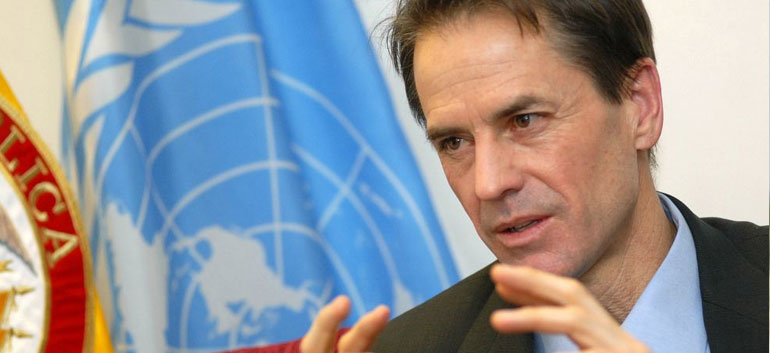The United Nations warned President Juan Manuel Santos Thursday that Colombia’s ongoing peace process with the FARC rebel group, the country’s largest, will not be sufficient to adress the deepening humanitarian crisis in the northwest of the country, reported local media
UN Human Rights High Commissioner Todd Howland deplored the ongoing violence in the northwestern state of Choco that has led to the “systematic” violation of residents’ human rights, reported Caracol Radio.
“We [the UN] want to alert the Colombian and international community because, although we are undergoing a peace process, Choco is suffering new breakdowns due to various illegal groups increasingly taking control of the territory,” said Howland.
Howland insisted that the ongoing peace negotiations between the Colombian government and the country’s largest rebel group, the FARC, in Havana, Cuba, will not have any effect on the situation in Choco, where displacement rates remain high as indigenous and Afro-descendent communities struggle to deal with the targeted violence directed against them.
“There is so much illegal activity in Choco that the problem is not going to be resolved with the demobilization of the FARC or the ELN [rebel groups], but rather the government must prepare to make changes to the economic activities of the zone,” said Howland, reported Caracol Radio.
MORE: Leader of displaced community assassinated in west Colombia
Various armed groups, including rebel and neoparamilitary armies, maintain active presences in Choco, where profitable illegal mining activity has led to massive deforestation, displacement, and environmental degradation.
High Commissioner Howland’s comments come in the wake of similar denunciations by Colombia’s Episcopalian Church of the humanitarian crisis in the region.
MORE: Episcopalian Church denounces humanitarian crisis in northwest Colombia
Government response
Colombian Vice-President, Angelino Garzon lamented the humanitarian crisis in Choco and affirmed that the government needs to face up to its “social debt” in the region.
“With social investment, the [Colombian] government ought to confront the crisis in Choco,” said vice-president Garzon, reported Caracol Radio.
The government must rapidly invest in health, education, potable water, and public recreation facilities in order to tackle the humanitarian crisis in Choco, said Vice-President Garzon, as quoted by Caracol Radio.
The situation in Choco has grown progressively worse over the course of the past several years, as a government response has proven unforthcoming.
A deepening crisis
Despite boasting among the most extensive natural resources in Colombia, Choco is one of the poorest states in the country.
Almost half of Choco’s inhabitants live in extreme poverty, meaning they are unable to provide for their basic sustenance, reported Caracol Radio. Food scarcity and access to health are major concerns throughout the state.
Criminals and narcotraffickers run the region, using the coastline to access trafficking routes across Latin America and Asia, and converting the area into “a place where the human condition is lost,” said Julio Hernando Garcia, the bishop of the Istmina municipality.
Forced displacement, economic blockades, intimidation tactics, rape, murders, and the recruitment of child soldiers are all widespread effects of the ongoing conflict for the state’s resources and narcotrafficking routes.
MORE: Over 4,000 indigenous people across Colombia displaced in 5 months: UN report
A UN report issued in June shows that over 2,000 people had been displaced in the region.
Choco – the forgotten state
In 2012 a Colombian politician landed himself in hot water when he likened investing in Choco to “adding perfume to a turd.”
MORE: Investing in Choco is like “adding perfume to a turd”: Politician
This is not the first time the Colombian government has been accused of neglecting the region. In 2012, many of Choco’s politicians expressed frustration over the lack of governmental support during a shut-down of the region allegedly caused by the guerilla group FARC:.
“If this shut-down had happened in another department, President Juan Manuel Santos and his military staff would have visited the area immediately,” said Victor Copete of the Choco-Pacifico foundation.
MORE: Choco leaders express frustration about lack of State support
The state, home to some of the most concentrated biodiversity on the planet, is predominantly indigenous and Afro, groups that have been traditionally ignored and exploited in Colombia.
Sources
- La ONU insta a Colombia a intervenir en el Chocó para frenar la violencia (Caracol Radio)
- “Con inversión social, Gobierno debe enfrentar crisis en Chocó” (Caracol Radio)
- Iglesia Denuncia Grave Crisis Humanitaria En Chocó (El Espectador)


